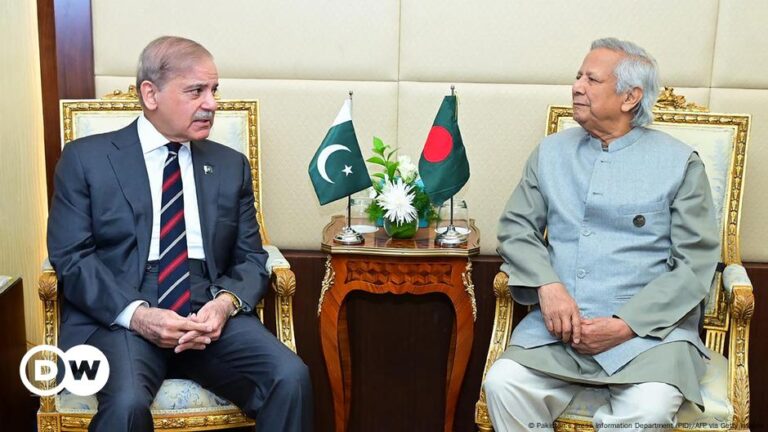Dhaka and Islamabad appear to be on the path to closer ties since Mohammad Yunus was appointed as Bangladesh’s interim leader in August after a student-led movement toppled the government of Sheikh Hasina.
Pakistan Prime Minister Shehbaz Sharif and Yunus agreed to deepen bilateral cooperation in all areas of mutual interest after the two leaders met on the sidelines of a conference in Cairo in December.
Maritime and military connections
The establishment of a direct sea link marked a thaw in historic ties, which had been under tension since the 1971 war of independence when Bangladeshi nationalists broke away from West Pakistan.
Bangladesh’s interim government also lifted previous regulations that required physical inspection of cargo from Pakistan.
Some media reports claim that Pakistan will start training the Bangladeshi army in February 2025, strengthening military ties between the two countries. Bangladesh is also reported to be joining Pakistan in the joint naval exercise Aman 2025 to be held at Karachi port.
As Pakistan strengthens ties with Bangladesh, there are concerns about potential security threats in the region, and India is closely monitoring developments that could reshape power relations in South Asia.
Strategic impact on India
Relations between Dhaka and New Delhi have frayed since the ouster of Hasina, who now lives in exile with Indian support.
Foreign policy experts and diplomats have stressed that India has to navigate a complex geopolitical environment characterized by instability and security threats in the northeastern states.
New Delhi is closely monitoring these developments while also increasing security along its border with Bangladesh.
“There is no doubt that relations between Bangladesh and Pakistan have improved overall. This change has security implications for India’s northeastern states,” said Shanti Mariet D’Souza, founder of Mantraya Institute of Strategic Studies. he told DW.
New Delhi is especially concerned about human trafficking, infiltration, and militancy along the border, as Bangladesh shares borders with the Indian states of West Bengal, Assam, Meghalaya, Tripura, and Mizoram, which are prone to violence. We have long been concerned about rebellion.
“A key question to consider is whether these strengthening ties are merely a response to India’s tactical pressure or part of a larger plan to destabilize India. The latter is true. Assuming that, does the current government in Dhaka have the luxury of pursuing it?’ Is there such a policy? The answer is no,” D’Souza said.
Expanding Pakistan’s influence in Bangladesh
D’Souza said it remains unclear whether Yunus’ policies will resonate with the Bangladeshi bureaucracy, for whom the interim government is a stopgap measure.
“New Delhi needs to have eyes and ears on the ground to develop policies to address the region’s rapidly changing internal and external power dynamics,” she added.
Ajay Visalia, former Indian High Commissioner to Pakistan, told DW that India’s long-standing relationship with neighboring countries, especially Bangladesh, was one that focused on promoting prosperity instead of addressing India’s security concerns. He said he was guessing.
“This understanding is being challenged by the new government in Dhaka,” Bisala said, adding that Pakistan’s efforts to rebuild security ties with Bangladesh and counter Indian influence are threatening to disrupt the regional security balance. It added that it could be destabilizing.
“While India will closely monitor this evolving power relationship, it may also need to check Pakistan’s growing influence in its eastern periphery through proactive military posture and security measures,” Bisala said. did.
Arms transfers raise concerns
Specifically, the new alliance between Pakistan and Bangladesh poses a serious threat to India’s strategic interests, especially the Siliguri corridor, which is often referred to as the chicken neck.
This geopolitically sensitive corridor connects the northeastern states of India with the rest of India through a narrow strip of Indian territory, 20 to 22 kilometers (12 to 14 miles) at its narrowest point. .
India is concerned that China may try to establish a presence near the corridor under the guise of development work with Bangladesh.
Meanwhile, India has strengthened security along its border with Bangladesh, introducing technological solutions and increasing high-level border security to address vulnerabilities and curb infiltration and smuggling in unfenced border areas. Inspections are being carried out by
Former Bangladesh High Commissioner Pinak Ranjan Chakravarti said, “India has security concerns about transferring arms and explosives to Bangladesh for use by Islamic terrorists released by the interim government led by Yunus.” There will be concerns,” he told DW.
Chakravarti argued that the transfer of these weapons to India’s rebel groups could pose serious security problems.
However, Sreeraddha Dutta, a Bangladeshi expert at the Jindal School of International Studies, told DW that although India-Bangladesh relations are currently going through a difficult period, the mood would be good once an elected government is formed in Bangladesh. He said he would calm down.
“Bangladesh and Pakistan are showing signs of involvement, but India occupies a more important position for the former,” Dutta said.
“Both sides need to overcome the current rhetoric and get down to business. Once bilateral engagement is resumed, India’s security concerns will certainly be recognized and this will be an unnecessary threat to its neighbors. This will only happen if we choose to engage without raising such issues,” concluded Mr. Dutta. .
Editor: Keith Walker


